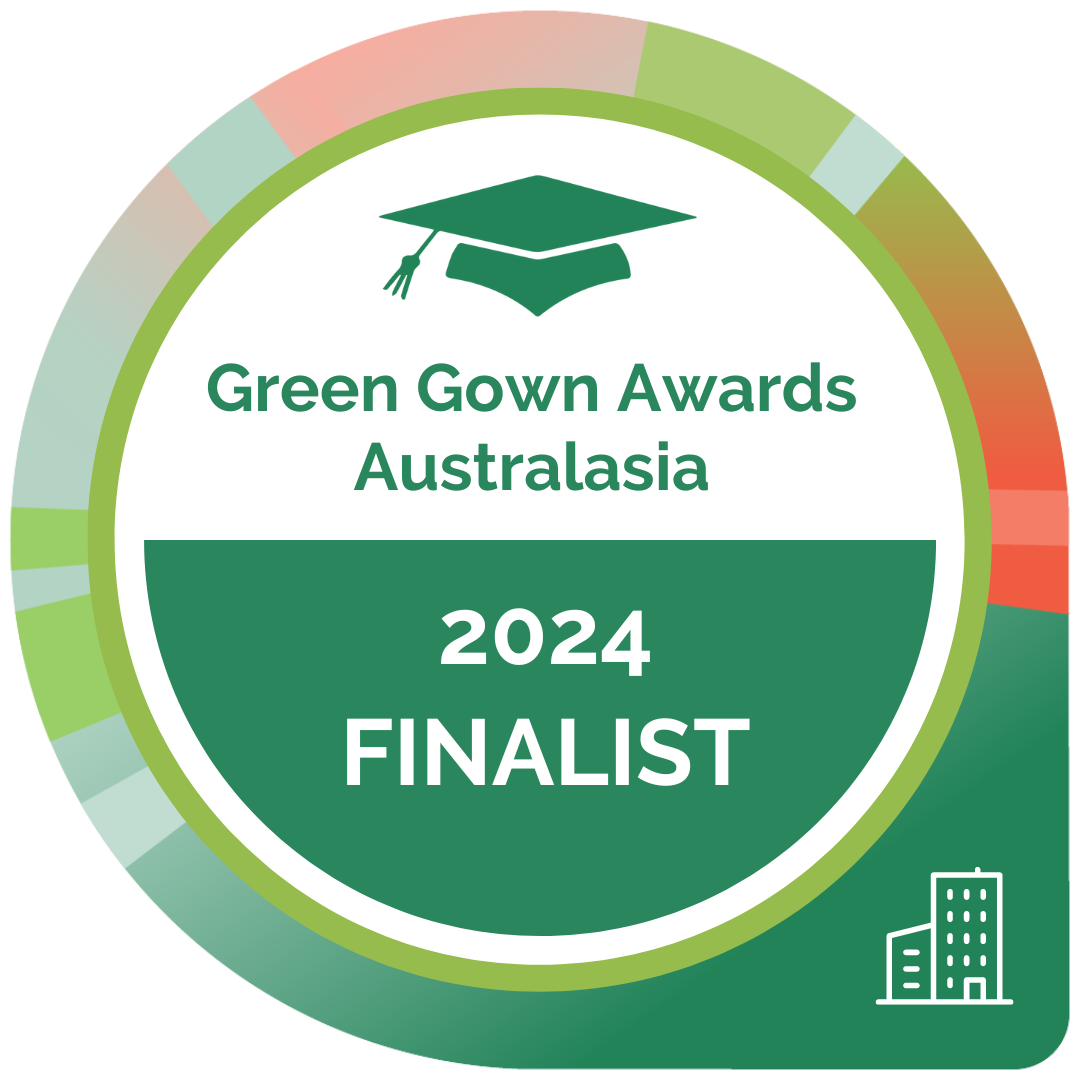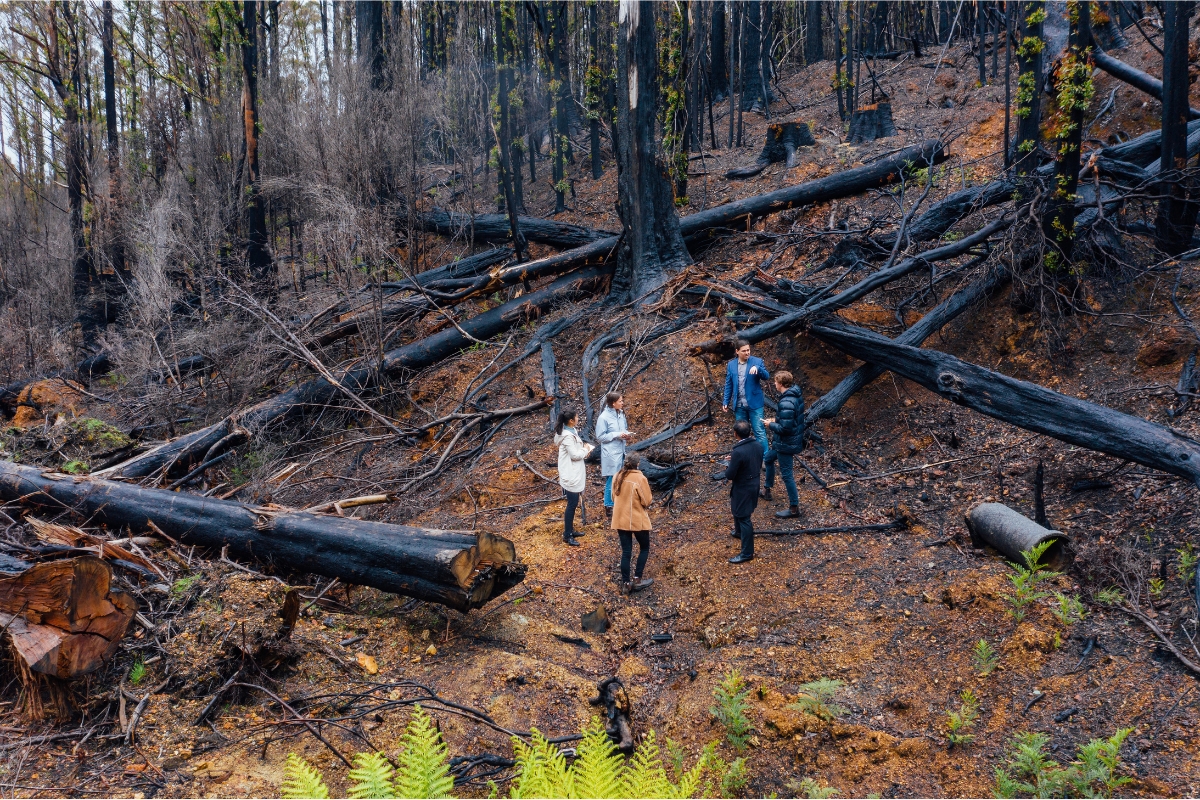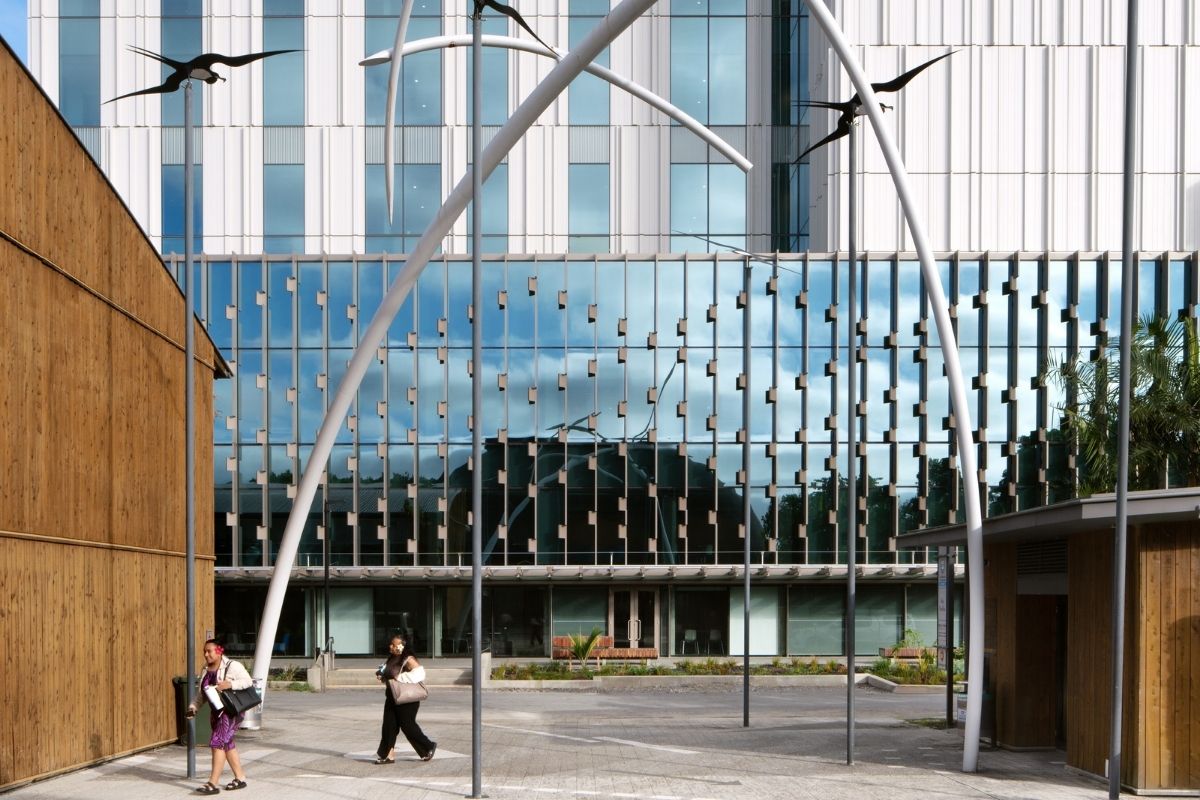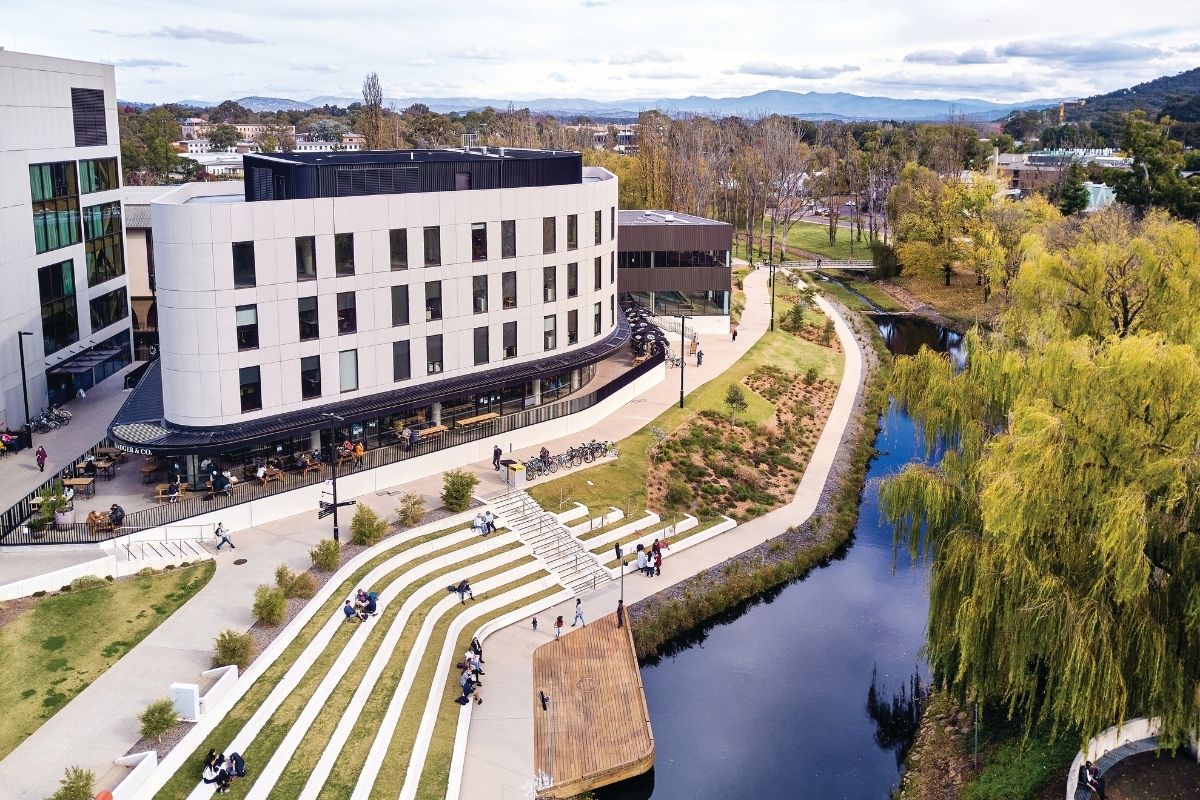Climate Action category
The Australian National University (ANU) has undertaken an innovative climate action initiative titled “Heat Pumped – Fossil-free heating for cold Canberrans.” This project involves the replacement of fossil fuel gas boilers with electric heat pumps across eight buildings on the ANU campus. The initiative aligns with the University’s strategic goals of reducing carbon emissions and promoting environmental sustainability as outlined in their Strategic Plan 2021-2025 and Corporate Plan 2024-2027. The project showcases their commitment to innovative and sustainable solutions in building management and climate action.
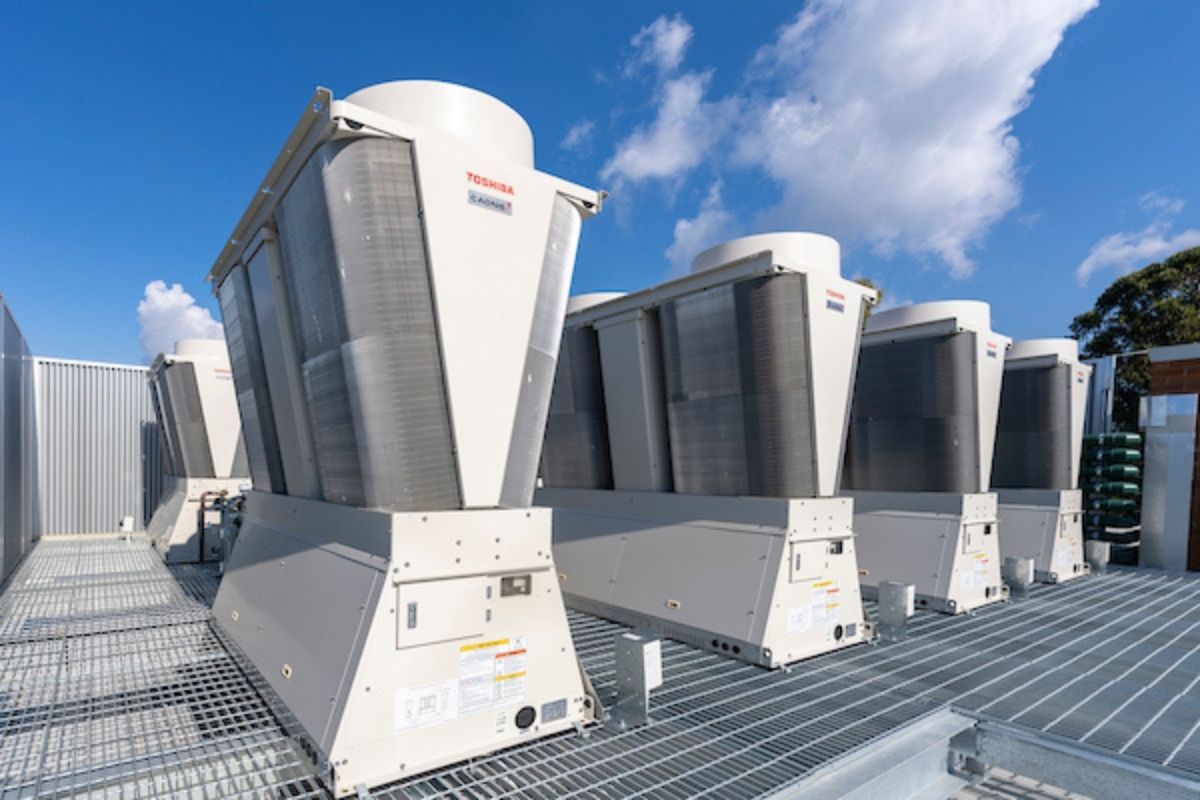
Environmental and Social Benefits
- Emission Reductions: The installation of electric heat pumps, powered by 100% renewable electricity, has reduced their carbon footprint by 900 tCO2e per annum, which is 6.5% of the university’s total emissions from gas. This aligns with the University’s climate goals and contributes to national emission reduction targets.
- Resource Conservation: The project emphasises the reuse of existing infrastructure and retrofitting buildings, which conserves resources and minimises waste. By avoiding the installation of new gas boilers, ANU prevents the creation of stranded assets.
- Social Empowerment: The initiative has provided extensive learning opportunities for students and staff, fostering a culture of sustainability and empowering the university community to engage in climate action.
Leadership and Engagement
- Student and Staff Involvement: An internal team of engineers led the project, supported by specialist contractors. The initiative included guest lectures and guided tours for students, directly engaging approximately 100 students and enhancing their understanding of sustainable building practices.
- Community and Industry Partnerships: The project involved collaboration with various stakeholders, including the CSIRO, ACT government, and industry consultants. The University’s engineering team also contributed to the Australian Institute of Refrigeration, Air-conditioning and Heating (AIRAH) by establishing a Special Technical Group for building electrification.
- Policy Influence: The project’s success demonstrates compliance with the ACT government’s policy of phasing out gas by 2045 and sets a benchmark for other institutions and sectors aiming to transition to renewable energy solutions.
Significance to the Sector
- Global Recognition: This project is one of the first large-scale implementations of heat pump technology in existing buildings within a cold climate, making it a model for similar initiatives globally. The project’s innovative solutions and successful implementation provide a valuable case study for the education and HVAC industries.
- Innovative Practices: The initiative utilised various heat pump technologies and system configurations, including modular installations and waste heat recovery, showcasing novel approaches to overcoming technical challenges associated with retrofitting buildings for renewable energy.
- Educational Leadership: By integrating the project into academic curricula and providing hands-on learning experiences, ANU has enhanced its educational offerings and reinforced its role as a leader in sustainability education.
Wider Societal Impact
- Economic and Social Co-Benefits: The project has not only reduced emissions but also demonstrated the financial viability of transitioning to electric heating solutions. It provides a pathway for other institutions and sectors to achieve similar environmental and economic benefits.
- Global Influence: The project’s relevance extends beyond the university sector, influencing the HVAC industry, construction, and maintenance sectors globally. It offers a replicable model for international audiences, particularly in colder climates reliant on gas for heating.
- Future Leaders: The initiative equips students with practical knowledge and skills in sustainable building practices, preparing them to become future leaders in climate action and environmental sustainability.
The Australian National University’s “Heat Pumped – Fossil-free heating for cold Canberrans” initiative exemplifies a pioneering approach to sustainability and climate action. Through innovative design, strong leadership, and extensive community engagement, ANU has significantly reduced its carbon footprint, set new standards for green building practices, and empowered its community. This project not only contributes to the University’s sustainability goals but also serves as a model for institutions and industries globally, showcasing the feasibility and benefits of transitioning to renewable energy solutions in existing buildings.
Top 3 learnings
Category finalists
Climate Action/Winners
Climate Action/Winners
Climate Action
Climate Action
Climate Action/Highly Commended
Climate Action/Highly Commended
Past winners
Benefitting Society/Winners
Benefitting Society/Winners
Diversity, Equity & Inclusion in Sustainability/Winners
Diversity, Equity & Inclusion in Sustainability/Winners
Climate Action/Winners
Climate Action/Winners
Sustainability Institution of the Year/Winners
Sustainability Institution of the Year/Winners
Creating Impact/Winners
Creating Impact/Winners
Creating Impact/Winners
Creating Impact/Winners
Top 3 learnings
Climate Action category
The Australian National University (ANU) has undertaken an innovative climate action initiative titled “Heat Pumped – Fossil-free heating for cold Canberrans.” This project involves the replacement of fossil fuel gas boilers with electric heat pumps across eight buildings on the ANU campus. The initiative aligns with the University’s strategic goals of reducing carbon emissions and promoting environmental sustainability as outlined in their Strategic Plan 2021-2025 and Corporate Plan 2024-2027. The project showcases their commitment to innovative and sustainable solutions in building management and climate action.

Environmental and Social Benefits
- Emission Reductions: The installation of electric heat pumps, powered by 100% renewable electricity, has reduced their carbon footprint by 900 tCO2e per annum, which is 6.5% of the university’s total emissions from gas. This aligns with the University’s climate goals and contributes to national emission reduction targets.
- Resource Conservation: The project emphasises the reuse of existing infrastructure and retrofitting buildings, which conserves resources and minimises waste. By avoiding the installation of new gas boilers, ANU prevents the creation of stranded assets.
- Social Empowerment: The initiative has provided extensive learning opportunities for students and staff, fostering a culture of sustainability and empowering the university community to engage in climate action.
Leadership and Engagement
- Student and Staff Involvement: An internal team of engineers led the project, supported by specialist contractors. The initiative included guest lectures and guided tours for students, directly engaging approximately 100 students and enhancing their understanding of sustainable building practices.
- Community and Industry Partnerships: The project involved collaboration with various stakeholders, including the CSIRO, ACT government, and industry consultants. The University’s engineering team also contributed to the Australian Institute of Refrigeration, Air-conditioning and Heating (AIRAH) by establishing a Special Technical Group for building electrification.
- Policy Influence: The project’s success demonstrates compliance with the ACT government’s policy of phasing out gas by 2045 and sets a benchmark for other institutions and sectors aiming to transition to renewable energy solutions.
Significance to the Sector
- Global Recognition: This project is one of the first large-scale implementations of heat pump technology in existing buildings within a cold climate, making it a model for similar initiatives globally. The project’s innovative solutions and successful implementation provide a valuable case study for the education and HVAC industries.
- Innovative Practices: The initiative utilised various heat pump technologies and system configurations, including modular installations and waste heat recovery, showcasing novel approaches to overcoming technical challenges associated with retrofitting buildings for renewable energy.
- Educational Leadership: By integrating the project into academic curricula and providing hands-on learning experiences, ANU has enhanced its educational offerings and reinforced its role as a leader in sustainability education.
Wider Societal Impact
- Economic and Social Co-Benefits: The project has not only reduced emissions but also demonstrated the financial viability of transitioning to electric heating solutions. It provides a pathway for other institutions and sectors to achieve similar environmental and economic benefits.
- Global Influence: The project’s relevance extends beyond the university sector, influencing the HVAC industry, construction, and maintenance sectors globally. It offers a replicable model for international audiences, particularly in colder climates reliant on gas for heating.
- Future Leaders: The initiative equips students with practical knowledge and skills in sustainable building practices, preparing them to become future leaders in climate action and environmental sustainability.
The Australian National University’s “Heat Pumped – Fossil-free heating for cold Canberrans” initiative exemplifies a pioneering approach to sustainability and climate action. Through innovative design, strong leadership, and extensive community engagement, ANU has significantly reduced its carbon footprint, set new standards for green building practices, and empowered its community. This project not only contributes to the University’s sustainability goals but also serves as a model for institutions and industries globally, showcasing the feasibility and benefits of transitioning to renewable energy solutions in existing buildings.
Related finalists
Climate Action/Winners
Climate Action/Winners
Climate Action
Climate Action
Climate Action/Highly Commended
Climate Action/Highly Commended
Other finalists
Climate Action

Driving Towards Tomorrow’s Campus with Vehicle-to-Grid EV Technology
As part of Flinders University’s drive to innovate and become a leader in climate action, the University launched its Vehicle-to-Grid (V2G) initiative. This involved installing and maintaining 20x V2G and smart chargers for its growing electric vehicle fleet. Leveraging 100% renewable energy generated by ENGIE’s Willogoleche Wind Farm and Flinders University’s solar power systems, this enables the storage of renewable energy in EV batteries to be discharged on campus during peak demand periods. Hence, allows for these EV fleets to operate as a Virtual Power Plant (VPP) to deliver peak demand management and optimization of behind-the-meter generation.
Overall, this initiative demonstrates the reliability and scalability of bi-directional and uni-directional smart-charging systems for EVs in reducing GHG emissions while facilitating teaching, research, and innovation opportunities. Moreover, it exemplifies a sustainable and innovative solution to scale energy storage technology and increase renewables.
Sustainability Champion – Staff/Winners

Brandan Espe
Environmental Officer / Acting Grounds Supervisor
Brandan has brought over 50 federally listed Endangered species of plant into the James Cook University living collection, many of which have never been cultivated and are found in no other collection in the world.
Of these, over half have been sustainably wild collected, inclusive of field and clone data, so they can be used for ongoing conservation, research and teaching, the remaining being sourced from private and partner organisations through favours of service or trades.
He personally funded the project from 2019-2022, until funding was awarded for the program due to its success, with the program now being engrained into the Universities landscapes for ongoing management should he leave JCU, creating a threatened species legacy collection.
The program has now expanded beyond this, with an additional 48 species now funded for further addition, some of which are only known from less than 5 sightings in history.
Student Engagement

Sustainability Leaders creating real impact!
La Trobe created a unique Sustainability Leaders volunteering program to increase engagement with students on campus and empower them to act against waste and promote sustainability. It included the following initiatives:
- Promoting the reusable crockery implementation,
- Increasing knowledge action of other students on campus to diversion comingled recycling and organic waste from landfill.
- Focus on waste audits and data,
- Improved signage through new waste posters for students living on campus.
- Collaboration with Cirka (our cleaning and waste partner) to create a waste wall and;
- Learning all things sustainability (net zero, biodiversity, waste, reusables, engagement)
These initiatives yielded significant results and with a reduction in waste contamination by almost 40% at the residential buildings and engagement with over 80 groups of people for the Reusable Revolution.
Creating Impact

Where knowledge meets habits: Empowering students for a sustainable tomorrow
Our online Sustainability Challenges offer participants an engaging, self-paced learning experience centered around a specific United Nations Sustainable Development Goal (UNSDG). Requiring minimal resourcing and at zero-cost to participants, we’ve created replicable, compact, scalable, and impactful learning opportunities that result in real impact.
The Challenges follow a structured process that moves participants from knowledge gain to simple action to celebration, to establish small but mighty habits relating to waste and carbon emissions. This approach recognises that knowledge alone is often insufficient to drive behaviour change, and that ease of action and celebration are crucial components in creating sustainable habits.
Sustainability Champion – Staff/Winners

Catherine (CeeJay) Donovan
Veterinary nurse – Anaesthesia
From establishing the Massey Vet School Green Team to leading impactful initiatives, my commitment to environmental sustainability has been making waves. With the help of my team, I have accomplished numerous small, yet meaningful actions, including integrating a sustainability lecture for final year vet students and implementing battery recycling alongside rechargeable battery use. Our larger projects encompass the introduction of green waste and soft plastics recycling bins, an energy audit resulting in power-saving measures, and playing a part in a successful rubbish audit. I spearheaded the ‘6 in 6’ campaign, empowering individuals with six simple steps for workplace sustainability. Through the SustainaVet social media pages I help to educate and inspire peers nationwide. As the Massey School of Veterinary Science sustainability champion, I had the privilege of speaking at the annual veterinary conference on sustainability in clinical practice. Currently I’m conducting pioneering research on responsible cat waste disposal. Together, we’re forging a greener future, one initiative at a time.
Sustainability Champion – Student

Louis Walmsley
SDG Coordinator Monash Association of Sustainability, Office Bearer Monash Student Association’s Environmental and Social Justice Department, Masters of Environment and Sustainability Student
Louis is an exceptional student sustainability leader at Monash University. His passion and dedication to sustainability have made a significant impact on the community. Louis’s values revolve around sustainability, which is evident upon meeting him. He actively participates in various sustainability groups, demonstrating his commitment to creating a more environmentally conscious society.
One of Louis’s notable involvements is with Precious Plastic Monash, where he organizes remarkable events and fosters collaboration among like-minded individuals, student groups, and staff. His contributions to the Monash Association of Sustainability have allowed him to conduct valuable research on plastic usage and climate action, resulting in positive changes within the university.
Through his work with the Monash Student Association, Louis has engaged hundreds of students in fun and interactive sustainability initiatives. He took the initiative to organize a sustainability food fair, which was one of the largest sustainability-related events held at Monash post-COVID. This accomplishment is a true testament to Louis’s hard work and creativity.
Louis is an outstanding student leader whose efforts in sustainability have had a lasting impact on Monash University and its community. His inspiring nature resonates with everyone who knows him.


